进行时态表将来
现在进行时表现将来用法详解

现在进行时表示将来现在进行时表示将来,主要用于表示按计划或安排要发生的动作。
常有“意图”“安排”或“打算”的含义。
这种现在进行时比较生动,给人一种期待感。
它常表最近或较近的将来,所用动词多是转移动词。
表将来的现在进行时除用于转移动词外,亦可用于某些非转移动词。
能这样用的动词常用的有:arrive, come, do, get, go, have, leave, meet, play, return, see, spend, start, stay, wear, work 等。
如:I’m leaving tomorrow. 我明天走。
They’re getting married next month. 他们下个月结婚。
Are you meeting Bill this evening? 你今晚将和比尔见面吗?1) come, go, stay, arrive, leave 等词的现在进行时经常用来表示将来确切的计划。
2) 表示交通方式、行程安排的动词,例如fly,walk, ride, drive, take(a bus, a taxi)等的现在进行时也经常用于表示将来。
如:但偶尔也表示较远的将来。
如:When I grow up, I’m joining the army. 我长大了要参军。
3)表将来的现在进行时有时含有“决心”的意思,多用在否定结构中。
如:I’m not going. 我不走了。
I’m not waiting any longer. 我不再等了。
有时也用在肯定结构中。
如:I’m backing out. 我要打退堂鼓了。
4)用这种现在进行时与对方讲话时可变成命令,不过语气比较温和。
如:You are staying. 你留下吧。
Don’t forget: you are taking part too. 不要忘记:你也要参加。
5)现在进行时也可在时间、条件或原因状语从句中表示将来。
现在进行时表示将来用法详解
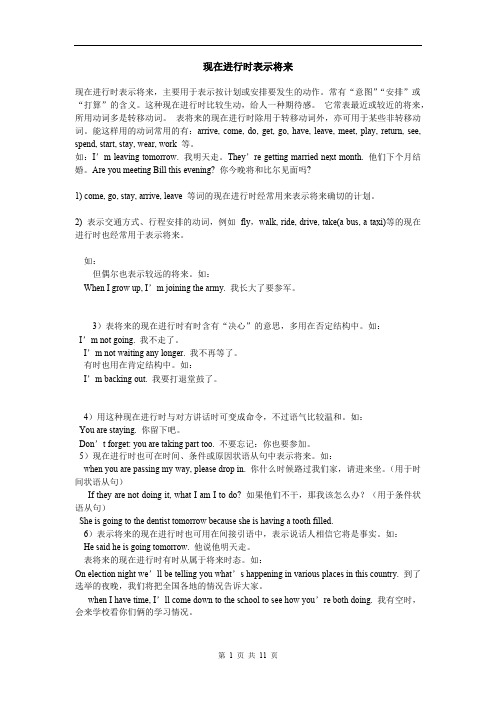
现在进行时表示将来现在进行时表示将来,主要用于表示按计划或安排要发生的动作。
常有“意图”“安排”或“打算”的含义。
这种现在进行时比较生动,给人一种期待感。
它常表最近或较近的将来,所用动词多是转移动词。
表将来的现在进行时除用于转移动词外,亦可用于某些非转移动词。
能这样用的动词常用的有:arrive, come, do, get, go, have, leave, meet, play, return, see, spend, start, stay, wear, work 等。
如:I’m leaving tomorrow. 我明天走。
They’re getting married next month. 他们下个月结婚。
Are you meeting Bill this evening? 你今晚将和比尔见面吗?1) come, go, stay, arrive, leave 等词的现在进行时经常用来表示将来确切的计划。
2) 表示交通方式、行程安排的动词,例如fly,walk, ride, drive, take(a bus, a taxi)等的现在进行时也经常用于表示将来。
如:但偶尔也表示较远的将来。
如:When I grow up, I’m joining the army. 我长大了要参军。
3)表将来的现在进行时有时含有“决心”的意思,多用在否定结构中。
如:I’m not going. 我不走了。
I’m not waiting any longer. 我不再等了。
有时也用在肯定结构中。
如:I’m backing out. 我要打退堂鼓了。
4)用这种现在进行时与对方讲话时可变成命令,不过语气比较温和。
如:You are staying. 你留下吧。
Don’t forget: you are taking part too. 不要忘记:你也要参加。
5)现在进行时也可在时间、条件或原因状语从句中表示将来。
现在进行时表将来的用法归纳

现在进行时表将来的用法归纳现在进行时是英语中的一种时态,它通常用来表示目前正在进行或正在发生的动作。
然而,在某些情况下,现在进行时也可以用来表示将来即将发生的动作。
本文将对现在进行时表达将来的用法进行归纳,探讨其具体应用方式。
一、表示已经计划或安排的活动现在进行时可以用来表示已经计划或安排好的将来动作。
这种用法常用于口语交流中,用来表达即将到来的计划或安排。
例如:1. I'm seeing a movie with my friends tonight.(今晚我和朋友们要去看电影。
)2. She is having dinner with her parents tomorrow.(她明天要和父母一起吃晚饭。
)二、表示即将发生的事件或趋势现在进行时还可以用来表示即将发生的事件或趋势,用以表达将来的计划、趋势或趋向。
这种用法常见于新闻报道或评论中,用于描述即将到来的情况。
例如:1. The company is expanding its business in the Asian market.(该公司正计划在亚洲市场扩展业务。
)2. The population is increasing rapidly in this city.(这座城市的人口正在快速增长。
)三、表示对现在的描述,暗示将来的变化现在进行时还可以用来对现况进行描述,并暗示将来可能发生的变化。
这种用法常见于描述当前趋势或现象,并预测将来的发展。
例如:1. The climate is getting warmer due to global warming.(由于全球变暖,气候正在变暖。
)2. The technology is advancing rapidly, which will greatly change our lives.(技术正在快速进步,这将极大地改变我们的生活。
)四、表示反复发生的动作或习惯现在进行时还可以用来表示习惯性的、反复发生的动作。
bedoing表将来和will的区别
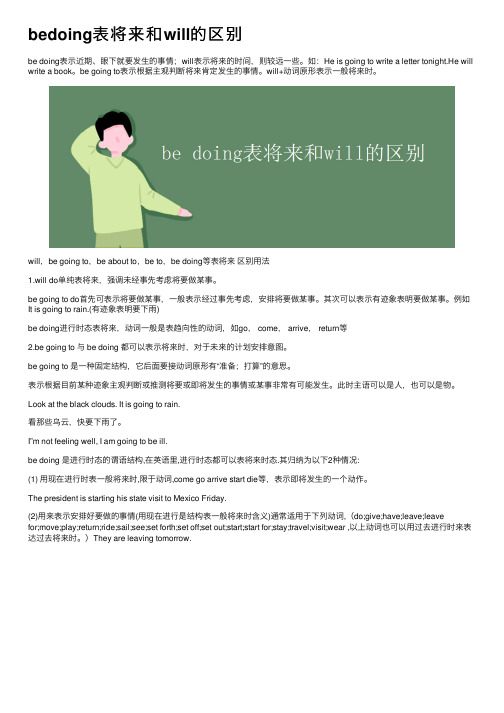
bedoing表将来和will的区别be doing表⽰近期、眼下就要发⽣的事情;will表⽰将来的时间,则较远⼀些。
如:He is going to write a letter tonight.He will write a book。
be going to表⽰根据主观判断将来肯定发⽣的事情。
will+动词原形表⽰⼀般将来时。
will,be going to,be about to,be to,be doing等表将来区别⽤法1.will do单纯表将来,强调未经事先考虑将要做某事。
be going to do⾸先可表⽰将要做某事,⼀般表⽰经过事先考虑,安排将要做某事。
其次可以表⽰有迹象表明要做某事。
例如It is going to rain.(有迹象表明要下⾬)be doing进⾏时态表将来,动词⼀般是表趋向性的动词,如go, come, arrive, return等2.be going to 与 be doing 都可以表⽰将来时,对于未来的计划安排意图。
be going to 是⼀种固定结构,它后⾯要接动词原形有“准备;打算”的意思。
表⽰根据⽬前某种迹象主观判断或推测将要或即将发⽣的事情或某事⾮常有可能发⽣。
此时主语可以是⼈,也可以是物。
Look at the black clouds. It is going to rain.看那些乌云,快要下⾬了。
I”m not feeling well, I am going to be ill.be doing 是进⾏时态的谓语结构,在英语⾥,进⾏时态都可以表将来时态.其归纳为以下2种情况:(1) ⽤现在进⾏时表⼀般将来时,限于动词,come go arrive start die等,表⽰即将发⽣的⼀个动作。
The president is starting his state visit to Mexico Friday.(2)⽤来表⽰安排好要做的事情(⽤现在进⾏是结构表⼀般将来时含义)通常适⽤于下列动词,(do;give;have;leave;leavefor;move;play;return;ride;sail;see;set forth;set off;set out;start;start for;stay;travel;visit;wear ,以上动词也可以⽤过去进⾏时来表达过去将来时。
现在进行时表将来通用课件

使用现在进行时表达未来的动作 或状态,强调该动作或状态即将 发生。
与其他时态的区别
与一般现在时的区别
一般现在时表示现在发生的动作或状 态,不涉及未来。
与一般将来时的区别
一般将来时明确表示未来的动作或状 态,与现在时间没有直接联系。
使用的情境与场合
计划安排
表达即将发生的动作
当计划在未来某个时间点进行某个动 作或事件时,可以使用现在进行时表 将来。
示例 They are getting married next month.(他们下个月结 婚。)
表示预测或推断的动作
01
总结词
这个时态用于描述基于当前情况或常识的预测或推断,通常表示一种可
能性或趋势。
02 03
详细描述
现在进行时可以表示基于当前情况或常识的预测或推断,通常表示一种 可能性或趋势,如“The weather is getting warmer, so spring is coming”(天气越来越暖和,所以春天来了)。
在学术活动的日程安排或会议议程中,现在进行时可以用来表示未来的计划或活动,例如 “会议正在安排在周三上午9点开始”。
在商务沟通中的应用
商务计划和报告
在制定商业计划或撰写商业报告 时,可以使用现在进行时来描述 未来的目标、计划或预期成果, 例如“公司正在制定下一财年的 销售目标”。
会议和谈判
在进行商务会议或谈判时,现在 进行时可以用来表达即将讨论的 议题或即将达成的协议,例如“ 我们正在讨论合作的具体细节”。
在日常交流中的应用
日常闲聊
在非正式的日常闲聊中,人们常常使用现在进行时来表达即将发 生的事情,例如“我们正在去公园”表示即将去公园。
安排和计划
现在进行时表将来的用法归纳

现在进行时表将来的用法归纳一、用法归纳1. 表示计划或安排现在进行时表示将来意义,主要用于谈论已经计划或安排好的动作,所涉及的动词有些是表示位置移动的,有些不一定是表示位置移动的,但总的说来,能这样用的动词比较有限,主要有arrive, come, dine, do, drive, fly, get, go, have, leave, meet, play, return, see, sleep, spend, start, stay, travel, wear, work等。
如:I’m leaving tonight. I’ve got my plane ticket. 我今天晚上就要动身了,已经买好了机票。
I’m meeting Peter tonight. He is taking me to the theatre. 今天晚上我要跟彼得会面。
他要带我去看戏。
“What are you doing this evening?” “I’m washing my hair.” “你今晚打算做什么?”“我要洗头。
”I hate to trouble you, but Aunt Lina’s birthday is coming up and I would like to buy something nice for her. 我真不愿打扰您,但莉娜阿姨的生日就要到了,我想给她买点好东西。
2. 表示即将发生对于即将要发生的动作,不管是计划好的还是没有计划好的,通常都可用现在进行时来表示。
如:I’m just going out to the post office. Back in a minute. 我要到邮局去,一会儿就回来。
Get your coat on! I’m ta king you down to the doctor! 穿好外衣! 我这就带你去看医生! —Jim, would you come here, please? 吉姆,请过来一下好吗?—OK, I’m coming. 好的,我就来。
进行时表将来时的用法
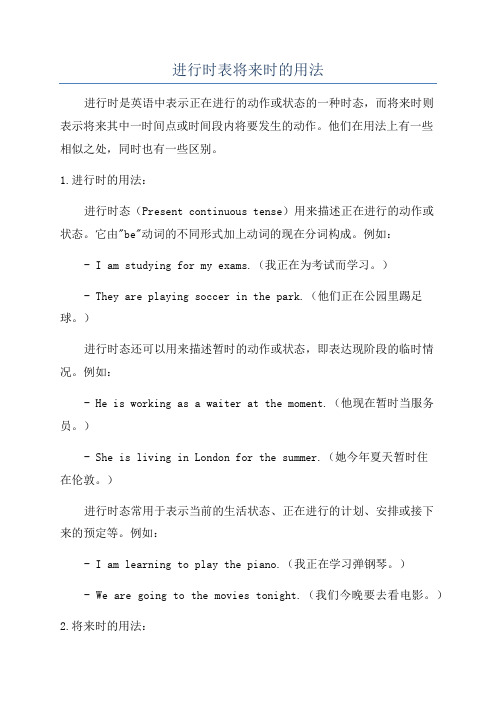
进行时表将来时的用法进行时是英语中表示正在进行的动作或状态的一种时态,而将来时则表示将来其中一时间点或时间段内将要发生的动作。
他们在用法上有一些相似之处,同时也有一些区别。
1.进行时的用法:进行时态(Present continuous tense)用来描述正在进行的动作或状态。
它由"be"动词的不同形式加上动词的现在分词构成。
例如:- I am studying for my exams.(我正在为考试而学习。
)- They are playing soccer in the park.(他们正在公园里踢足球。
)进行时态还可以用来描述暂时的动作或状态,即表达现阶段的临时情况。
例如:- He is working as a waiter at the moment.(他现在暂时当服务员。
)- She is living in London for the summer.(她今年夏天暂时住在伦敦。
)进行时态常用于表示当前的生活状态、正在进行的计划、安排或接下来的预定等。
例如:- I am learning to play the piano.(我正在学习弹钢琴。
)- We are going to the movies tonight.(我们今晚要去看电影。
)2.将来时的用法:英语中有多种表示将来时的方式,包括将来进行时(Future continuous tense)、将来完成时(Future perfect tense)、将来完成进行时(Future perfect continuous tense)等。
这里介绍主要用于表示将来的进行时态。
将来进行时(Future continuous tense)用来描述将来其中一时间点或时间段内正在进行的动作。
它由"will be"或"shall be"后面接动词的现在分词构成。
例如:- They will be traveling to Europe next summer.(明年夏天他们将在欧洲旅行。
现在进行时表将来用法详解

现在进行时表将来现在进行时态由助动词be(am, is, are) + doing构成1、表示现阶段正在进行的动作。
They are reading book.他们正在读书。
The boy is lying on the playground.那个男孩正在操场上躺着。
2.表示根据计划、安排即将发生的动作或行为,此时句子中一般有一个表示将来的时间状语。
What are doing at this weekend?这个周末你要做什么?【拓展延伸】不是所有的动词都可以用进行时态表将来时态,只有表示具有位置移动意义的移位动词及少部分其它意义的动词才可以用进行时态表将来时间常见动词如下:arrive,begin,come,die,go,leave,end,return,start,travel,fly,stop,close,drive,fall,remain,stay,move,land,leave for,take off,see… off Hurry up. The plane is taking off soon. 快点, 飞机马上就要起飞了He’s coming here next week.他下周要来“He is dying, doctor. You must save him,” cried the young woman.“他快要不行了,医生,你必须救救他!”那位年轻妇女哭叫着【典型例题】1. --- Is this raincoat yours?--- No, mine _______there behind the door.A. is hangingB. has hungC. hangsD. hung【解析】选A 用现在进行时态,表示说话时“我的正挂在门后面”。
现在进行时表示存在的状态,防止用被动。
2. I first met Lisa three years ago. She ______ at a radio shop at the time.A. has workedB. was workingC. had been workingD. had worked【解析】选B 用过去进行时态表示当时见到她时,“她正在一个无线电厂工作”。
现在进行时表将来的用法归纳

现在进行时表将来的用法归纳现在进行时是英语中的一个时态,主要用来表达正在进行的动作或事件。
但是,在某些情况下,现在进行时也可以用来表示即将发生的将来事件。
本文将对现在进行时表将来的用法进行归纳和总结。
一、表计划或安排现在进行时可以用来表示某人已经作出计划或者已经安排好的事情。
例如:1. I'm meeting my friends at the café tomorrow afternoon.(我明天下午要在咖啡馆见朋友。
)2. She is going shopping with her sister this weekend.(她周末要和她姐姐一起去购物。
)二、表意向或打算现在进行时还可以用来表达某人的意向或打算。
例如:1. We are going to spend our summer vacation in Hawaii.(我们打算在夏威夷度假。
)2. He is thinking about becoming a doctor in the future.(他正在考虑将来成为一名医生。
)三、表未来安排或约定现在进行时也经常用来表示已经进行的未来安排或约定。
例如:1. They are going to the movies tonight.(他们今晚要去看电影。
)2. We are having a party next weekend.(下周末我们要举办一个派对。
)四、表即将发生的趋势或变化现在进行时还可以表示某种即将发生的趋势或变化。
例如:1. The weather is getting colder.(天气变得越来越冷了。
)2. The population is increasing rapidly.(人口正在快速增长。
)五、表反复出现的动作现在进行时也可以用来表示近期反复发生的动作。
例如:1. She is always leaving her keys in the office.(她总是把钥匙忘在办公室。
现在进行时表将来的用法归纳

现在进行时表将来的用法归纳一、用法归纳1. 表示计划或安排现在进行时表示将来意义,主要用于谈论已经计划或安排好的动作,所涉及的动词有些是表示位置移动的,有些不一定是表示位置移动的,但总的说来,能这样用的动词比较有限,主要有arrive, come, dine, do, drive, fly, get, go, have, leave, meet, play, return, see, sleep, spend, start, stay, travel, wear, work等。
如:I’m leaving tonight. I’ve got my plane ticket. 我今天晚上就要动身了,已经买好了机票。
I’m meeting Peter tonight. He is taking me to the theatre. 今天晚上我要跟彼得会面。
他要带我去看戏。
“What are you doing this evening” “I’m washing my hair.” “你今晚打算做什么”“我要洗头。
”I hate to trouble you, but Aunt Lina’s birt hday is coming up and I would like to buy something nice for her. 我真不愿打扰您,但莉娜阿姨的生日就要到了,我想给她买点好东西。
2. 表示即将发生对于即将要发生的动作,不管是计划好的还是没有计划好的,通常都可用现在进行时来表示。
如:I’m just going out to the post office. Back in a minute. 我要到邮局去,一会儿就回来。
Get your coat on! I’m taking yo u down to the doctor! 穿好外衣! 我这就带你去看医生!—Jim, would you come here, please 吉姆,请过来一下好吗—OK, I’m coming. 好的,我就来。
现在进行时表将来的用法归纳

现在进行时表将来的用法归纳直接答案:现在进行时可以用于表示将来要发生的事件或计划。
它通常用来指示已经安排好或已经计划的未来事件,表达个人的打算或安排。
扩展讨论:现在进行时主要用来描述目前正在发生或暂时未完成的动作,但在某些情况下,它也可以用来表示将来会发生的事情。
以下是几种常见的现在进行时表将来的用法。
1. 安排的未来事件:现在进行时经常用于描述已经安排好或计划中的未来事件,尤其是关于旅行、会议、聚会等特定时间和地点的活动。
例如:- I am flying to Paris tomorrow. (我明天要飞往巴黎。
)- She is attending a conference next week.(她下周要参加一个会议。
)- They are throwing a party on Friday.(他们周五要举办一个派对。
)2. 某人的打算或安排:现在进行时也可以用来表示个人的打算或安排。
例如:- I am meeting John for lunch later.(我等一下要和约翰吃午饭。
)- We are going to the movies tonight.(我们今晚要去看电影。
)- He is studying for his exam tomorrow.(他正在为明天的考试复习。
)3. 临时的决定或走向:现在进行时有时也可以用来表示临时的决定或走向,即在说话时没有提前计划或安排,但现在正在发生的事情。
例如:- I am starting a new project next week.(我下周要开始一个新项目。
)- They are moving to a new city next month.(他们下个月要搬到一个新城市。
)- The company is expanding their business overseas.(公司正在扩大海外业务。
)需要注意的是,现在进行时表将来的用法并不是所有动作都适用。
现在进行时表将来描述即将发生的行动
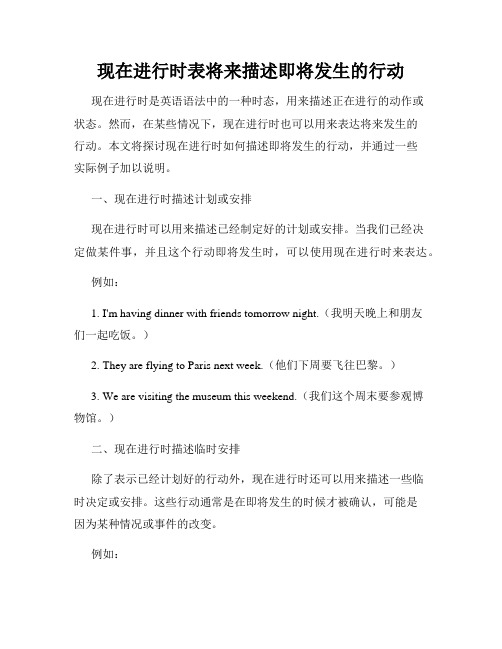
现在进行时表将来描述即将发生的行动现在进行时是英语语法中的一种时态,用来描述正在进行的动作或状态。
然而,在某些情况下,现在进行时也可以用来表达将来发生的行动。
本文将探讨现在进行时如何描述即将发生的行动,并通过一些实际例子加以说明。
一、现在进行时描述计划或安排现在进行时可以用来描述已经制定好的计划或安排。
当我们已经决定做某件事,并且这个行动即将发生时,可以使用现在进行时来表达。
例如:1. I'm having dinner with friends tomorrow night.(我明天晚上和朋友们一起吃饭。
)2. They are flying to Paris next week.(他们下周要飞往巴黎。
)3. We are visiting the museum this weekend.(我们这个周末要参观博物馆。
)二、现在进行时描述临时安排除了表示已经计划好的行动外,现在进行时还可以用来描述一些临时决定或安排。
这些行动通常是在即将发生的时候才被确认,可能是因为某种情况或事件的改变。
例如:1. I'm going to the supermarket after work.(我下班后要去超市。
)2. They are moving the meeting to next Monday.(他们将会议延到下周一。
)3. We are having an emergency drill tomorrow morning.(明天上午我们将进行紧急演习。
)三、现在进行时描述未来时间的行动在某些情况下,现在进行时可以用来描述将来某个特定的时间段内即将发生的行动。
例如:1. She is starting her new job next month.(她下个月将开始她的新工作。
)2. They are getting married in December.(他们将于12月份结婚。
)3. We are going on vacation next week.(下周我们将去度假。
现在进行时表将来&聚焦记叙文类 阅读理解
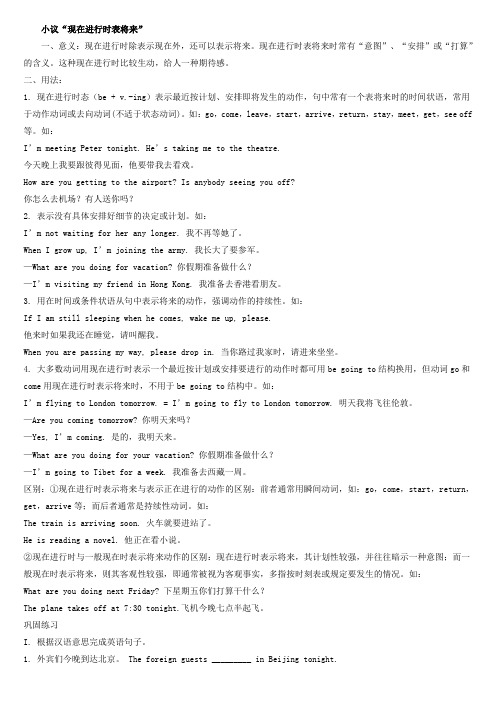
小议“现在进行时表将来”一、意义:现在进行时除表示现在外,还可以表示将来。
现在进行时表将来时常有“意图”、“安排”或“打算”的含义。
这种现在进行时比较生动,给人一种期待感。
二、用法:1. 现在进行时态(be + v.-ing)表示最近按计划、安排即将发生的动作,句中常有一个表将来时的时间状语,常用于动作动词或去向动词(不适于状态动词)。
如:go,come,leave,start,arrive,return,stay,meet,get,see off 等。
如:I’m meeting Peter tonight. He’s taking me to the theatre.今天晚上我要跟彼得见面,他要带我去看戏。
How are you getting to the airport? Is anybody seeing you off?你怎么去机场?有人送你吗?2. 表示没有具体安排好细节的决定或计划。
如:I’m not waiting for her any longer. 我不再等她了。
When I grow up, I’m joining the army. 我长大了要参军。
—What are you doing for vacation? 你假期准备做什么?—I’m visiting my friend in Hong Kong. 我准备去香港看朋友。
3. 用在时间或条件状语从句中表示将来的动作,强调动作的持续性。
如:If I am still sleeping when he comes, wake me up, please.他来时如果我还在睡觉,请叫醒我。
When you are passing my way, please drop in. 当你路过我家时,请进来坐坐。
4. 大多数动词用现在进行时表示一个最近按计划或安排要进行的动作时都可用be going to结构换用,但动词go和come用现在进行时表示将来时,不用于be going to结构中。
现在进行时表将来
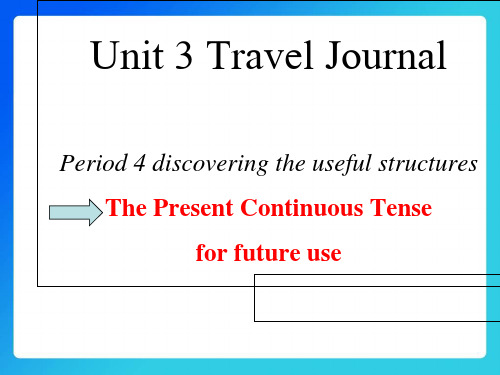
I’m leaving tomorrow. He is coming back this Sunday. How are you getting there?
表达将来旳时态还有下列措施:
① will/shall+动词原形,表达将来某个时间要发生旳 动作或存在旳状态;或表达自然趋势或非主观意志 。 e.g. He will write you a letter next week. I shall be sixteen years old next month.
A. is hanging B. has hung
C. hangs
D. hung
7. ---What’s that terrible noise? ---The neighbours __B__ for a party. A. have prepared B. are preparing C. prepare D. will prepare
17. --Do you think we should accept that offer?
--Yes, we should, for we _A__ such bad luck up till now, and time ___ out. (2023江西) A. have had; is running B. had; is running C. have; has been run D. have had; has been run
---You can when you _A__ a bit old.
A. get
B. will get
C. are getting D. will have got
完整版现在进行时表将来知识梳理

现在进行时表将来概念引入现在进行时是我们非常熟悉的时态,常表示说话时正在发生的动作,如:Why are you crying ? Is something wrong? 你为什么在哭?有什么不对吗?但是观察这些句子:1.1 ' m going我要走了。
2. What are you doing next Sunday? 下星期你打算干什么?3. Don ' t forget: you are taking part too. 不要忘记:你也要参加。
4. She is going to the dentist tomorrow because she is having a tooth filled. 她明天要去看牙医,因为她的牙需要补。
这些句子中的谓语动词都是现在进行时,但是谈论的都是将来的事,这就是本单元我们要学习的内容。
语法讲解现在进行时表将来1. 现在进行时表示将来主要用于表示按照计划或安排将要发生的动作或事件,常表示最近或较近的将来,有“意图”、“安排”或“打算”,给人期待感,多是转移动词,如:come, go, start, arrive, leave, stay 等。
I ' m leaving tomorrow.我打算明天离开。
Are you staying here till next week? 你要在这儿待到下个星期吗?They ' re coming here this after noon.今天下午他们要来这儿。
She is leaving on the New York flight. 她要乘飞纽约的航班去。
Do you know if he is going to school tomorrow? 你知道明天他上不上学吗?What time are you coming back? 你准备什么时候回来?I am starting early tomorrow morning. 我打算明天一早就动身。
现在进行时表将来
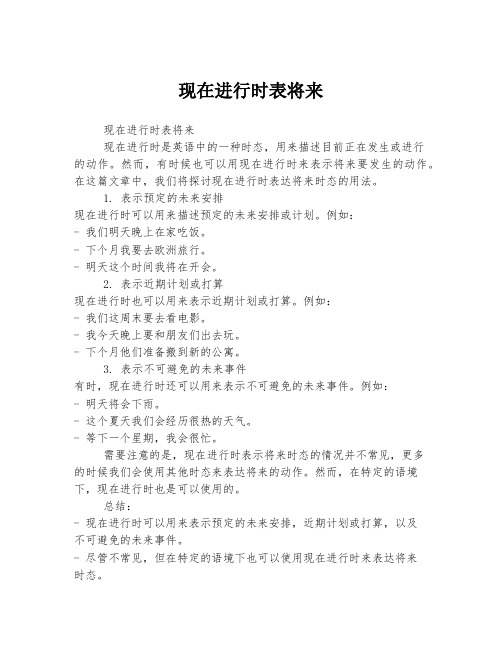
现在进行时表将来
现在进行时表将来
现在进行时是英语中的一种时态,用来描述目前正在发生或进行
的动作。
然而,有时候也可以用现在进行时来表示将来要发生的动作。
在这篇文章中,我们将探讨现在进行时表达将来时态的用法。
1. 表示预定的未来安排
现在进行时可以用来描述预定的未来安排或计划。
例如:
- 我们明天晚上在家吃饭。
- 下个月我要去欧洲旅行。
- 明天这个时间我将在开会。
2. 表示近期计划或打算
现在进行时也可以用来表示近期计划或打算。
例如:
- 我们这周末要去看电影。
- 我今天晚上要和朋友们出去玩。
- 下个月他们准备搬到新的公寓。
3. 表示不可避免的未来事件
有时,现在进行时还可以用来表示不可避免的未来事件。
例如:
- 明天将会下雨。
- 这个夏天我们会经历很热的天气。
- 等下一个星期,我会很忙。
需要注意的是,现在进行时表示将来时态的情况并不常见,更多
的时候我们会使用其他时态来表达将来的动作。
然而,在特定的语境下,现在进行时也是可以使用的。
总结:
- 现在进行时可以用来表示预定的未来安排,近期计划或打算,以及
不可避免的未来事件。
- 尽管不常见,但在特定的语境下也可以使用现在进行时来表达将来
时态。
简而言之,尽管现在进行时不是常见的将来时态的表达方式,但在特定场合下可以这样使用。
掌握这一用法能够帮助我们更好地理解和运用英语语法。
现在进行时表将来的用法归纳

现在进行时表将来的用法归纳在英语学习中,时态的运用是非常重要的一个环节。
其中,现在进行时除了表示正在进行的动作外,还可以用来表示将来。
这种用法可能会让一些学习者感到困惑,但只要理解其规律和特点,就能轻松掌握。
一、现在进行时表将来的基本概念现在进行时表将来,指的是用现在进行时的形式来表达计划、安排好的,即将要发生的动作。
这些动作通常是事先安排好的,并且发生的时间在不久的将来。
二、现在进行时表将来的常见动词1、表示位移的动词像“come(来)”、“go(去)”、“leave(离开)”、“arrive(到达)”、“return(返回)”等表示位移的动词,常用现在进行时表将来。
例如:“I'm coming(我马上来。
)”、“He is leaving for Beijing tomorrow(他明天要去北京。
)”2、其他动词除了位移动词,还有一些动词如“fly(飞行)”、“travel(旅行)”、“start(开始)”、“move(移动)”等,在特定语境中也可以用现在进行时表将来。
比如:“We are flying to N ew York next week(我们下周要飞往纽约。
)”三、现在进行时表将来的时间状语当使用现在进行时表将来时,常常会有一些特定的时间状语来加以说明。
常见的时间状语有:“tomorrow(明天)”、“next week(下周)”、“soon(不久)”、“in a few days(几天后)”、“this evening(今晚)”等。
例如:“She is going shopping this evening(她今晚要去购物。
)”、“They are moving to a new house nex t month(他们下个月要搬到新房子里。
)”四、现在进行时表将来与一般将来时的区别1、结构不同现在进行时表将来的结构是“be +现在分词”,而一般将来时的结构是“will +动词原形”或“be going to +动词原形”。
现在进行时表将来

9 .在 “u h h a ) s ”句 型 中,关 系代 词要 用 a,而不 用 w i 。 sc  ̄ e sme…a… s hc h We n e u h ma r l a 不 用 w ih a erhg e eaue ed sc t i s sf ea hc1cn b a ih tmprtr. 1.表 示 “ 0 正如 … …那 样 ”“ ,正像 … …” 意时,关 系 代词 用 a。不用 w i 。 之 s hc h
中 英 之 .中上 刊⑨ 学 语 友高 .旬
现在进行 时表将来
现 在进 行 时除 表示 现在 外 , 可 以表 示将 来 。现 在 进行 时表将 来 时 常 有 “ 图 ” 安 排 ” 还 意 “ 或 “ 打算 ” 的含 义 。这种 现在 进行 时 比较 生动 , 给人 一种 期待 感 。 它 常表 最近 或较 近 的将来 . 所用 动 词多 是转 移动 词 。如 : f1I on .我要 走 了。 l ' gig m f)Wh n ae yu s r n ?你 什么 时候 动身 ? 2 e l o t t g ai 表 将来 的现 在进 行时 除用 于转 移 动词外 , 可用 于某 些非 转移 动 词 。如 : 亦 f1I e t gy u a e l s 1 ' m e n o f rca 。课后 我 找你 。 m i t s f1Wh tae v H d ig n x S n a ?下 星期你 打算 干什 么 ? 2 a r O on e t u d y 但偶 尔也 表示 较远 的将 来 。如 : Wh n Igo p ' pnn h r y e rw u ,I i ig te am .我 长大 了要 参军 。 m i 表将 来 的现在 进行 时有 时含 有 “ 决心 ” 的意思 , 多用 在 否定结 构 中。如 : ()I 0 g ig 1 ' n t on .我不 走 了。 m ()I o w in n o gr 2 ' n t a ig ay ln e.我 不再 等 了 。 m t 有 时也用 在肯 定结 构 中 。如 : I a kn u.我要 打退 堂鼓 了 ' b c ig ot m 用这 种现 在进 行 时与对 方讲 话 时可变 成命 令 . 不过 语气 比较 温 和 。如 : f)Y u ae s yn .你 留下 吧 。 1 o r t ig a ()D nt ogt o r a ig p r t .不要 忘记 : 也要 参 加 。 2 o' fre :yu ae tkn at o o 你 同一般 现在 时一 样 , 现在进 行 时也 可在 时 间 、 件或 原 因状语 从 句 中表示 将来 。如 : 条 ()Wh n yu ae p sig m a , laedo n 1 e o r as y w y pe s rp i. n ◎ 你 什 么时候 路过 我们 家 , 进来 坐 。 ( 于 时间状 语从 句 ) 请 用 2 9 ()I te r o d ig i w a m It d ? 2 f h y ae nt on t h ta o o , ◎ 如 果他 们不 干 , 我该 怎 么办 ? ( 于条 件状 语从 句 ) 那 用 表 示将来 的现在进 行 时也 可用 在 间接 引语 中 。 示说 话人 相信 它将 是 事实 。如 : 表 H ad h sg ig tm r w e si ei on o or .他说 他 明天 走 。 o 表将 来 的现 在进行 时有 时从 属 于将 来时 态 。如 : ()O lc o ih el b el g y u w a' h p e ig i ai s pae i hs 1 n eet n ng t w ' e tln o h t ap nn n vr u l s n ti i l i s o c cu t .到 了选 举 的夜 晚 , o nr y 我们 将 把全 国各地 的情 况告诉 大 家 。 语 ( 2 )Wh n Ih v i ,Ilc m o n t te sh o t e o o ’ oh d ig e a et me ' o e d w o h c ol o se h w yur b t o . l e n 之 我有 空时 , 会来 学校 看你 们俩 的学 习情 况 。 交
进行时态表将来的用法
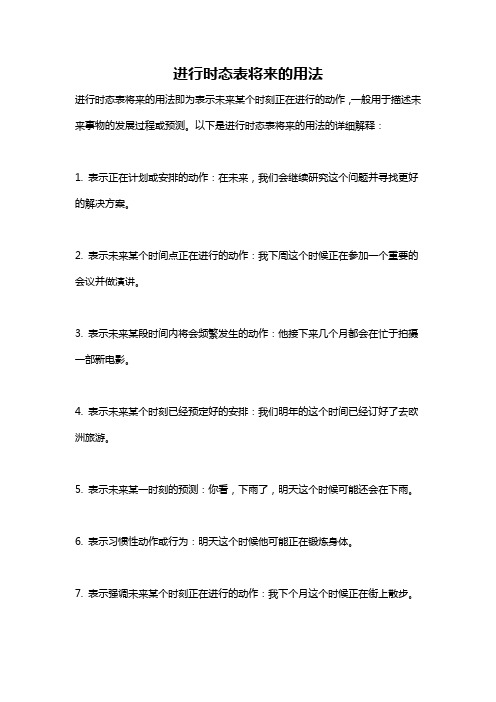
进行时态表将来的用法
进行时态表将来的用法即为表示未来某个时刻正在进行的动作,一般用于描述未来事物的发展过程或预测。
以下是进行时态表将来的用法的详细解释:
1. 表示正在计划或安排的动作:在未来,我们会继续研究这个问题并寻找更好的解决方案。
2. 表示未来某个时间点正在进行的动作:我下周这个时候正在参加一个重要的会议并做演讲。
3. 表示未来某段时间内将会频繁发生的动作:他接下来几个月都会在忙于拍摄一部新电影。
4. 表示未来某个时刻已经预定好的安排:我们明年的这个时间已经订好了去欧洲旅游。
5. 表示未来某一时刻的预测:你看,下雨了,明天这个时候可能还会在下雨。
6. 表示习惯性动作或行为:明天这个时候他可能正在锻炼身体。
7. 表示强调未来某个时刻正在进行的动作:我下个月这个时候正在街上散步。
总之,进行时态表将来的用法是比较灵活的,主要是形容未来某个时刻正在进行的动作或预测。
使用进行时态可以更准确地描述未来的情况,让句子更有说服力和真实性。
同时,灵活运用进行时态也能让表达更加自然,增强语言表达能力。
进行时态表将来的用法
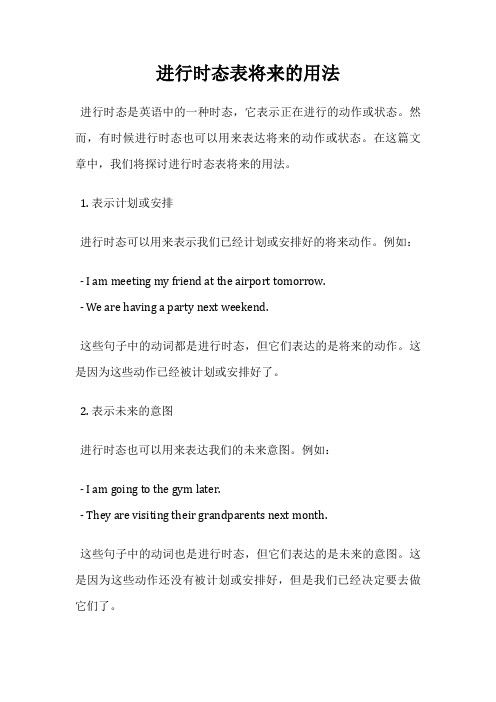
进行时态表将来的用法
进行时态是英语中的一种时态,它表示正在进行的动作或状态。
然而,有时候进行时态也可以用来表达将来的动作或状态。
在这篇文章中,我们将探讨进行时态表将来的用法。
1. 表示计划或安排
进行时态可以用来表示我们已经计划或安排好的将来动作。
例如:
- I am meeting my friend at the airport tomorrow.
- We are having a party next weekend.
这些句子中的动词都是进行时态,但它们表达的是将来的动作。
这是因为这些动作已经被计划或安排好了。
2. 表示未来的意图
进行时态也可以用来表达我们的未来意图。
例如:
- I am going to the gym later.
- They are visiting their grandparents next month.
这些句子中的动词也是进行时态,但它们表达的是未来的意图。
这是因为这些动作还没有被计划或安排好,但是我们已经决定要去做它们了。
3. 表示逐渐发生的动作
进行时态还可以用来表达逐渐发生的动作。
例如:
- The sun is setting.
- The flowers are blooming.
这些句子中的动词也是进行时态,但它们表达的是逐渐发生的动作。
这是因为这些动作需要一段时间才能完成,而不是一瞬间完成。
进行时态可以用来表达将来的动作或状态,包括计划、意图和逐渐发生的动作。
当我们使用进行时态来表达将来时,我们需要考虑上下文和语境,以确保我们的意思清晰明了。
- 1、下载文档前请自行甄别文档内容的完整性,平台不提供额外的编辑、内容补充、找答案等附加服务。
- 2、"仅部分预览"的文档,不可在线预览部分如存在完整性等问题,可反馈申请退款(可完整预览的文档不适用该条件!)。
- 3、如文档侵犯您的权益,请联系客服反馈,我们会尽快为您处理(人工客服工作时间:9:00-18:30)。
be doing vs be going to do
I’m leaving tomorrow. I’ve got my I’ plane ticket. The windows are dirty. I’m going to I’ clean them later.
be doing 表示已安排进行的动作。 常用词:go, 表示已安排进行的动作。 常用词: arrive, come, leave, start, stay, return, play, do, have, work, wear, spend, see, meet, etc. be going to do 表示已做决定,但可能还没有安 表示已做决定, 排去做的动作。 排去做的动作。
Please look at the examples:
1. Bob is going with me to the airport tomorrow. 2. I’m getting there by train. I’ 3. What are you doing this evening? 4. How long are you staying in Xi’an? Xi’ 5. Mr. Wang is leaving for Shanghai on business. 6. We are probably spending next weekend at home.
Compare:
leaving What time are _____ you ________ tomorrow? does What time _____ the train leave _________ tomorrow? (leave) am going I ____________ to the cinema this evening. (go) starts The film ________ at 8:15 this evening. (start)
I'm babysitting on Thursday
Would you like to go out on Monday? No, sorry, I can’t can’ Why not? I’m babysitting on Monday. Would you like to go out on Tuesday? No, sorry, I can’t. can’ Why not? I’m doing my laundry on Tuesday. Would you like to go out on Wednesday? No, sorry, I can’t. can’ Why not? I’m working overtime on Wednesday.
Now she is planning our schedule for the trip. “be doing” for present use (表现在正在发生) doing” (表现在正在发生 表现在正在发生) 1) After graduating from college, we finally got the chance to take a bike trip. I asked my sister, “Where are we going?” going? 2) I kept asking her, “When are we leaving and when are we coming back?” back?”
Scotland. Ten days. Next Friday. No, with a friend of mine. No, by train. In a hotel
Your friend John plans to spend a holiday. He asks you about the plan. Where are we going? How are we going to…? to… Are you going with other friends? When are we leaving? When are we arriving in/at…? in/at… How long are we staying in…? in… When are we coming back? What attractions are we visiting? …
Practice:
4.罗教授什么时候到北京首都机场? 4.罗教授什么时候到北京首都机场 罗教授什么时候到北京首都机场? When is Professor Luo arriving at the Beijing Capital Airport? 5.我要在火车站送我的姐姐. 5.我要在火车站送我的姐姐 我要在火车站送我的姐姐. I’m seeing my sister off at the railway station.
Practice:
1. 我就来. 我就来. I’m coming. coming. 2.我要见一位非常重要的人. 2.我要见一位非常重要的人 我要见一位非常重要的人. I’m meeting a very important person. 3.飞机半小时后起飞. 3.飞机半小时后起飞 飞机半小时后起飞. The plane is taking off in half an hour.
Would you like to go out on Thursday? No, sorry, I can’t. can’ Why not? I’m working out on Thursday. Would you like to go out on Friday? No, sorry, I can’t. can’ Why not? I’m visiting relatives on Friday. Would you like to go out on the weekend? Well… Well… maybe!
A friend of yours is planning to go on holiday soon. You ask her about her plans.
(where/go?) Where are you going? (how long/ stay?) (when/go?) (go/alone?) (travel/by car?) (where/stay?)
She is going to the supermarket on Monday.
Tuesday, see the dentist
She is seeing the dentist on Tuesday.
Sunday, leave for London
She is leaving for London on Sunday.
Compare:
is getting Alex ____________ married next month. will succeed
I am sure you _______________. _______________.
Example:
The train leaves Beijing at 11:30 and arrives in Tianjin at 14:30. What time does the film begin? It is Wednesday tomorrow. Summary: 使用一般现在时表示 使用一般现在时表示timetable 如交通、电影等)的安排。 (如交通、电影等)的安排。
Summary: 使用现在进行时表示个人 “安 “意图 意图” 打算” 排”, “意图” 或 “打算”将来的 事情. 事情. 此时所使用的动词多是转移动词: 多是转移动词 此时所使用的动词多是转移动词:
go, come, arrive, leave, start, stay, return, 其他如 meet, etc.
我周五要和Anne一起吃饭。 我周五要和Anne一起吃饭。 一起吃饭 I am having dinner with Anne on Friday. 我明天不来。 我明天不来。 I am not coming tomorrow. Cathy 明天到。 明天到。 Cathy is arriving tomorrow.
Would you like to go out on Thursday? No, sorry, I can’t. can’ Why not? I’m working out on Thursday. Would you like to go out on Friday? No, sorry, I can’t. can’ Why not? I’m visiting relatives on Friday. Would you like to go out on the weekend? Well… Well… maybe!
“be doing” is used to show that something will happen but it has been arranged and can not 表示已安排要进行的动作) 表示已安排要进行的动作 be changed. (表示已安排要进行的动作)
This is Kitty’s diary for next week. Kitty’ Monday, go to the supermarket
“be doing” for future use (表将来的事情) doing” (表将来的事情 表将来的事情)
Grammar
The Present Continuous Tense: expressing futurity
I'm babysitting on Thursday
Would you like to go out on Monday? No, sorry, I can’t. can’ Why not? I’m babysitting on Monday. Would you like to go out on Tuesday? No, sorry, I can’t. can’ Why not? I’m doing my laundry on Tuesday. Would you like to go out on Wednesday? No, sorry, I can’t. can’ Why not? I’m working overtime on Wednesday.
